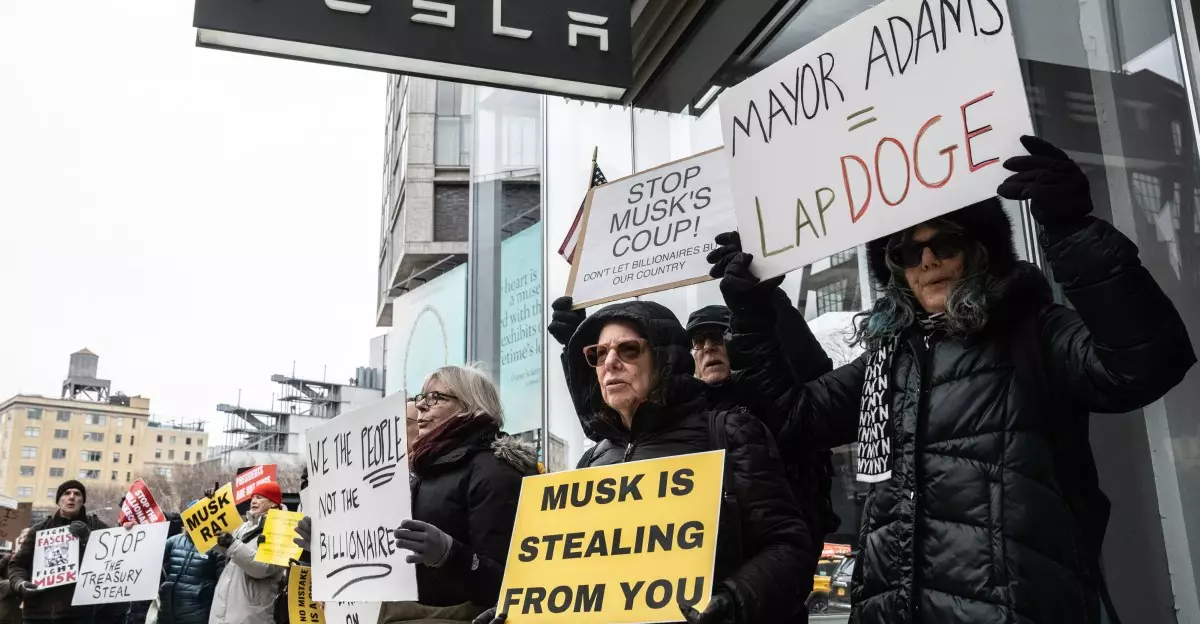In a striking manifestation of public discontent, protesters congregated outside Tesla showrooms across the United States this past weekend. This marked the continuation of a grassroots movement sparked by the trending hashtag #TeslaTakeover on platforms like Bluesky, reflecting a surge of activism primarily directed towards Tesla’s CEO, Elon Musk. As the head of the Department of Government Efficiency during Donald Trump’s presidency, Musk has become a polarizing figure, drawing both critique and support. The nationwide protests, though not characterized by massive crowds, were significant in number and scope, extending from bustling urban centers like New York City to smaller locales, such as Golden Valley, Minnesota.
At the heart of these protests lies a growing frustration with Musk’s controversial political affiliations and decision-making as Tesla’s leader. Demonstrators expressed their disillusionment through slogans aimed at highlighting claims that Musk’s governance has not only alienated certain consumer segments but may also be detrimental to the company’s financial performance. Reports have suggested that Tesla’s stock price decreased by 21 percent since the onset of the Trump administration, raising alarm among investors and staff alike. According to some employees, the general sentiment in company meetings has been that Tesla would thrive better without Musk at the helm—a sentiment underscored by multiple voices in the industry concerned about the potential long-term implications of his actions.
Various factions within the protests highlighted their grievances towards Musk’s perceived alignment with far-right ideologies, with chants such as, “Don’t buy swasticars!” echoing outside the iconic Tesla showroom in Manhattan. These sentiments, resonating with a broader conversation about corporate responsibility and political affiliation, paint a picture of a divided public. Celebrity involvement also played a role, with figures such as actor and activist Alex Winter putting a spotlight on the protests and using his platform to urge consumers to divest from Tesla. As Winter participated in the demonstrations, he reinforced the notion that activism against corporate complicity in socio-political issues is not only warranted but necessary.
The Varied Landscape of Demonstrations
The protests manifested in diverse ways, from traditional picketing outside Tesla showrooms in major cities like Austin and Seattle to individual acts of protest by public figures like musician Sheryl Crow, who symbolically removed her Tesla from her life. Crow’s statement, “There comes a time when you have to decide who you are willing to align with,” echoes a sentiment that many consumers may be feeling: the challenge of reconciling personal values with corporate engagement. Across social media, the #TeslaTakeover hashtag has generated substantial engagement, particularly on Bluesky, although it appeared to have garnered less traction on other platforms like X, Instagram, or Threads.
As protest activities continue, more demonstrations are slated for the upcoming President’s Day holiday, underscoring a sustained commitment among activists to keep the pressure on not just Musk but the far-reaching implications of his actions in the tech industry and beyond. Scheduled events in cities like Lowell, Maine, and Richmond, Virginia, highlight the strategic planning behind this movement, as organizers leverage social networks and community engagement tools to extend their reach.
As protests widen and intensify, the repercussions for Tesla, its investor base, and Musk himself are yet to be fully realized. This wave of activism not only serves to critique current governance but also represents a moral reckoning that many consumers and stakeholders are grappling with in this age of corporate accountability and ethical consumption. The ongoing debate about the implications of Musk’s actions and his connection to far-right ideologies are set to dominate conversations about Tesla’s future, as the company navigates the complex terrain of public perception, financial stability, and ethical leadership in an increasingly polarized world. The outcome of these protests may well reshape the narrative around Tesla and its visionary leader, determining whether they can regain public trust or if dissent will continue to grow.


Leave a Reply
You must be logged in to post a comment.